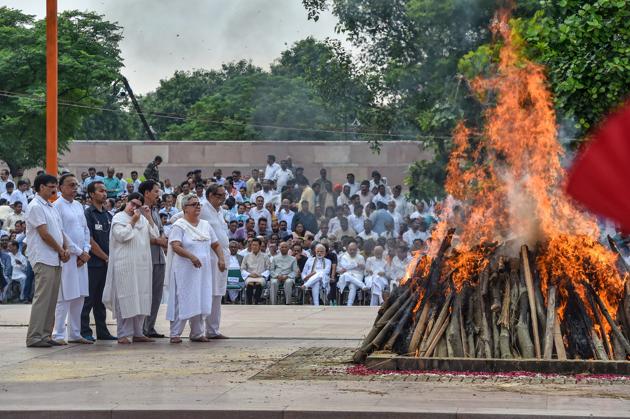Atal Bihari Vajpayee: A paradox who defied categorisation
Former PM Atal Bihari Vajpayee’s public display of unease at BJP’s turn towards more militant Hindutva politics and the Babri mosque demolition; his desire to take strong action after the 2002 riots; focus on economic reforms; and perpetual quest to improve ties with Pakistan have been cited to suggest that he was actually a man who had moved far beyond the confines of a particular ideology.
Atal Bihari Vajpayee’s relationship with the Rashtriya Swayamsevak Sangh (RSS) — it was both of convergence and differences —and his commitment to the Hindutva ideological framework (he was committed to the worldview, yet often went beyond it) has often generated curiosity.

Vajpayee’s aggressive speech in Assam’s Nellie in the early 1980s; his December 5, 1992 address in Lucknow on the eve of the Babri mosque demolition; and his Goa speech after the 2002 Gujarat riots have been cited to suggest that, at the core, the former PM shared the Sangh’s conception of the Hindu character of India. He was also, and this element has not been remarked upon enough, rather embedded in upper-caste networks and was unable to make the BJP a more inclusive party, in terms of giving representation to backward classes and Dalits.
But Vajpayee’s public display of unease at BJP’s turn towards more militant Hindutva politics and the Babri mosque demolition; his open and inclusive persona; his commitment to Parliament; his willingness to shed contentious issues and find common ground with allies and respect the opposition; desire to take strong action after the 2002 riots; focus on economic reforms leading to individual freedom; and perpetual quest, despite repeated setbacks, to improve ties with Pakistan have been cited to suggest that he was actually a man who had moved far beyond the confines of a particular ideology.
So was he a liberal who respected individual choice and democratic institutions and understood the need for messy compromises, or was he a conservative who believed that the state’s fundamental character must reflect the preferences of Hindu society and group identities were central in politics?
He was probably both. Maybe even a pragmatist as some have suggested. But what is true is that he defied easy ideological categorisation.
What does this duality mean in structural terms?
For one, it shows that Indian politics rewards flexibility. Critics will see it as hypocrisy. But only those leaders, especially from the BJP, who have been able to speak to multiple audiences have succeeded in a diverse polity. Narendra Modi, in fact, is another example of a leader who has straddled distinct images of being a Hindu leader, a man epitomising development, and increasingly, a garibon ka neta, a messiah of the poor. Those who get stuck in a particular image, much like LK Advani did, often fail. Vajpayee was conscious of this and it helped him break out of the opposition, which is where he spent all but eight years of his political career.
The second takeaway is how the Sangh is more pragmatic in its approach than it is given credit for. It may not have been comfortable with parts of Vajpayee’s political messaging. But it also recognised that Vajpayee was among its most important, successful and loyal products; a man who was rooted in the Sangh but had grown beyond it in appeal; who may not always do what some Sangh leaders would like but would never act against them actively either; a man who was their best bet in uniting ‘Hindu society’ and using state power to that end. Most Sarsanghchalaks recognised this and allowed him leeway. It was only KS Sudarshan — RSS chief during his PM-ship — who tried to block Vajpayee’s operational space. Vajpayee fought back. But the warm tributes that have come his way from the Sangh, and the deep respect he continues to command within the outfit’s rank and file, is a testament that they see him as their own. He too saw himself as anchored in the Sangh.
Finally, there is a lesson in how far Indian politics has travelled. Vajpayee benefited from BJP’s aggressive politics but maintained a degree of distance from it, which helped enhance his respectability among others — both regional parties as well as liberal opinion-makers. He led the party to a victory but because it did not have a majority, he kept key ideological issues on the back burner. If it had, perhaps he may have pushed the envelope on some of them. Much like today’s BJP has.






